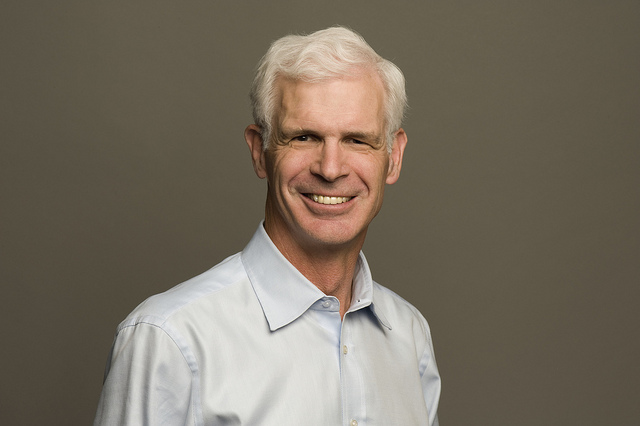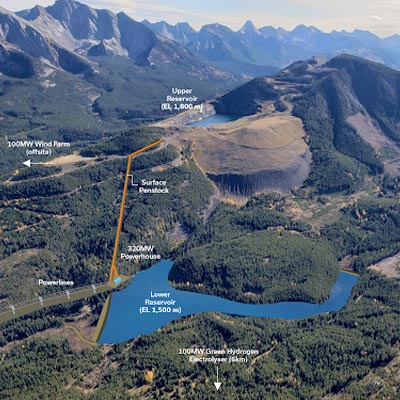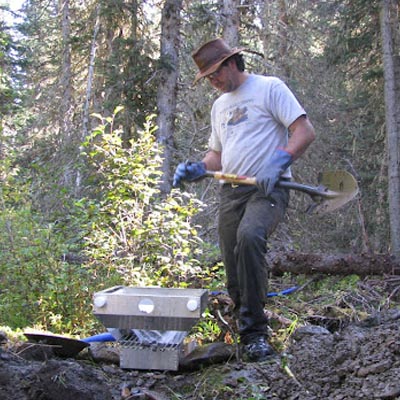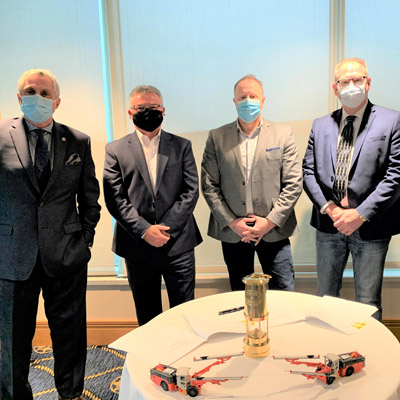An exciting gold project moves forward
The Blackwater gold-silver mine could open in 2017

Bob Gallagher is New Gold Inc.'s president and chief executive officer. — Photo courtesy New Gold Inc.
The chances for development of a major new gold-silver mine at British Columbia's massive Blackwater project appear to be getting brighter by the day.
The president and chief executive officer of Canadian-based New Gold Inc., Robert Gallagher, told the 10th annual B.C. Natural Resource Forum on January 10, 2013, in Prince George that if the price of gold remains high, New Gold should have a mine up and running at its 100 per cent-owned Blackwater project by 2017. Blackwater is located 160 kilometres southwest of Prince George.
"With the cash we have on hand and with the cash we should generate with our four existing mines, we have sufficient funds to build this mine," Gallagher said at the forum.
New Gold's four currently operational mines include its recently opened New Afton Mine just west of Kamloops, British Columbia, which began commercial production in July 2012.
Big hopes for Blackwater
The proposed Blackwater open-pit gold-silver mine would produce an annual average of 507,000 ounces of gold and 2,039,000 ounces of silver over its initial 15-year mine life, according to a positive preliminary economic assessment (PEA) that New Gold released this past September. The company began a feasibility study concerning the project almost immediately after the PEA's release.
"This is our flagship," Gallagher said about Blackwater after his January 10 presentation. "This mine will produce more gold than our other four (operating) mines combined. So it's huge for us.
"It's more than twice the investment that New Afton was. It's $1.8 billion. But we currently have some $700 million in the bank. And that, and cash flow from our four mines over the next four years, will fully fund the project."
New Gold submitted a project description for Blackwater—initiating a harmonized federal and provincial environmental review—this past November. The company hopes to complete its feasibility study in the fourth quarter of 2013 and gain provincial and environmental assessment approvals in the second half of 2014.
If the mine is approved, construction could begin in 2015, employing 1,000 to 1,500 workers.
Investment reflects confidence
Gallagher also said New Gold's recent exploration activity at Blackwater demonstrates his company's strong interest in building a mine. Drills operating at the site peaked at 19 this past summer and completed 260,000 metres of drilling.
"We spent $130 million on exploration (in 2012)," Gallagher said. "I mean, that's huge. That, for sure, is the biggest exploration project in B.C.—if not in all of Canada."
But there are even more indications that New Gold has increasing interest in Blackwater.
In March 2012, the company announced it had acquired 223 square kilometres of land (the Auro Properties) immediately southeast of the property. That purchase, along with other aggressive land acquisitions it made in late 2011 to the west and northwest, now means the project is approximately 900 square kilometres in size.
The extra land means not only increased exploration potential around the original 240-square-kilometre property but also more room for mine infrastructure development, Gallagher said.
But even without the extra land, Blackwater is becoming more and more attractive. This past July, New Gold announced that indicated resources on the original Blackwater property, based on drilling up to May 14, 2012, had increased by 30 per cent.
At that time (New Gold's most recent figures), the estimated indicated mineral resource at Blackwater totalled 7.52 million ouces of gold and 36.9 million ounces of silver, at a gold-equivalent cut-off of 0.30 grams per tonne. The company will release its latest update in the first week of February, Gallagher said.
Aboriginal considerations
In the meantime, New Gold has other important issues to resolve at Blackwater. It already has signed two exploration co-operation agreements with First Nations and has started discussing an impact benefit agreement with two First Nation bands with territorial interests concerning the proposed mine site.
Gallagher is hopeful New Gold will be successful in its negotiations, at least partly because the company has been successful in similar negotiations concerning its New Afton Mine. Also, over 23 per cent of more than 200 employees hired by New Gold during Blackwater's exploration phase are First Nations people.
The company has also won at least four awards in the past three years, including a Corporate Advocate for Aboriginal Business Award.
The golden future
As for a possible increased mineral resource at Blackwater due to recently acquired properties—and thus an even longer mine life—Gallagher said that will depend on drilling.
"Basically we know on the surface there's gold, and the occurrence of the gold at the surface is very similar to what's at Blackwater," said Gallagher. "Do we have another Blackwater? That's what the business is all about. It's an exciting aspect of it."




